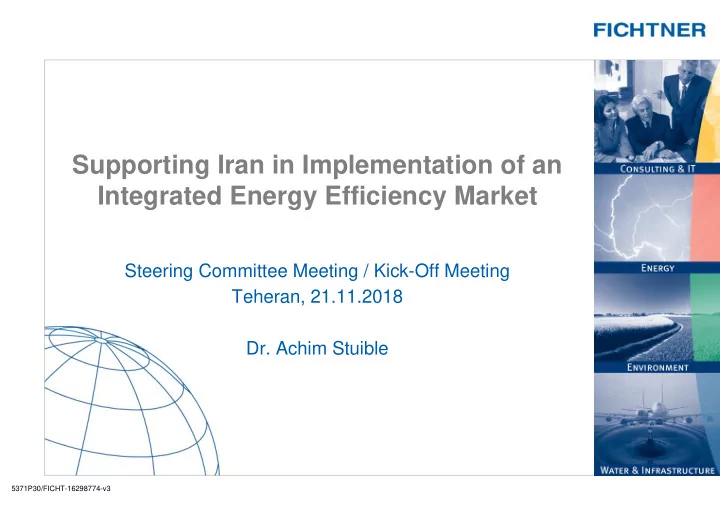

Supporting Iran in Implementation of an Integrated Energy Efficiency Market Steering Committee Meeting / Kick-Off Meeting Teheran, 21.11.2018 Dr. Achim Stuible 5371P30/FICHT-16298774-v3
Table of content 1 Introduction 2 Scope of Work 3 Preliminary Findings from first Mission to Kerman 4 Next Steps 2
1 Introduction 3
The Energy Efficiency Consultant for Rural Projects Federal Ministry for the Vice President Environment, Nature for Science and Technology Conservation and Nuclear Safety Steering Committee DIW Econ Dr. Stuible (Project Director) Fichtner Mr. Rehrl (Project Manager) GmbH kmw Dr. Komaei (Business Director Iran) outreach Mr. Pröger (Business Mr. Sielschott (Energy Efficiency) Director) Further Experts 4
2 Scope of Work 5
Scope of Work – Outputs Fichtner Package Fichtner Package: Development of pre-feasibility studies for potential energy efficiency projects in selected rural regions, which could be realized applying Article 12 under M3E Indicators for the Fichtner Package • Indicator 1 – Pre-Feasibility Studies Pre-feasibility studies for potential energy efficiency projects in the selected rural regions, which are eligible under Article 12 • Indicator 2 – Financing concepts Financing concept for energy efficiency projects applying Article 12 under M3E 6
Scope of Work – Activities under Fichtner’s Package • Selection of pilot regions Selection of 3 pilot regions with potential to develop rural EE projects which could be feasible within M3E • Assessment of Status Quo Status Quo of EE potentials in 3 pilot regions with site visits and identification of potential project ideas • Walk-through audits Analyze and develop potential projects and assess expected energy savings • Pre-feasibility studies Pre-feasibility studies for potential M3E EE projects • Financing concepts Analysis of potential (M3E-)financing concepts for these EE projects 7
3 Preliminary Findings from first Mission to Kerman 8
Site Visit to Kerman (18. - 19.11.2018) • Commitment to energy efficiency, environment and social responsibility of: • Governor of Kerman • Governor of Chatroud • Butia Iranian Steel Complex (BISCO) 9
Site Visit to Kerman • Selected Pilot Rural Region: Chatroud ( ﺩﻭﺭﺗﭼ ) • Distance from Kerman City: 45km (NW) • Rural Population: 21‘263 (2016) • Main Activity: Agriculture (66%) Familiarization with the region N 45km Chatroud 10
Site Visit to Kerman • Why Chatroud ( ﺩﻭﺭﺗﭼ )? • Similar Potential Rural Areas • Kerman • Yazd • South Khorasan • Sistan & Baluchistan • Investor available (Butia Steel Co.) N 45km Chatroud 11
Electricity demand in Chatroud region in GWh/yr Agriculture consumes 75% of electricity • Mainly for water pumping 12
Time Schedule of Site Visit to Kerman Date Place/Event Location Focus Kick-Off meeting Bisco High interest and support of 18.11.2018 Bisco & Kerman Governor Poultry Slaughterhouse Zahmat-Keshan land Sewage water Brick Production Zahmat-Keshan land Passage furnace Kerman Sewage Treatment Sharf-Abad Water re-usage Plant & Bisco‘s Pump House Resalat education complex Kazem-Abad Evaporation cooling – water consumption Events hall Kazem-Abad 19.11.2018 Pistachio farmland Rahim-Abad Underground and traditional irrigation Poultry farm Tikdar Heat recovery ? Ice making factory Chatrood Photovoltaic potential ? Pistachio processing factory Houtk Gas consumption for drying Pistachio farmland Sarasiab 6 Pressurized irrigation 13
Preliminary Findings Modern facilities Brick production The visited facilities and buildings Batch production of bricks by were relatively modern and natural gas fired ovens. Possibility adapted to local requirements. to implement continuous oven. Low energy saving potential Some energy saving potential The shortage of water is the prevailing issue Water shortage in the region (the same for some 70% or the territory of Iran) is the main problem in most of the visited potential projects. Saving water results in saving energy and sustainable improvements for people in rural areas. To make them eligible a suitable baseline needs to be established. 14
Preliminary Findings for Kerman (Chatroud) The ground water level decreases by more than two meters every year . The current wells currently supply water from a depth larger than 200m . Picture taken at Resalat Education Complex in Kazem-Abad, Chatroud, November 19 th 2018 15
4 Next Steps 16
Next Steps • Site Visits to other preselected regions (Shif Island in Bushehr Province, Maragheh region in East Azerbaijan Province) • Questionnaire for energy consumption of Chatroud and/or selected cities and villages • Specification / definition of “rural areas” • Specification of minimum savings • To recover transaction costs (incl. monitoring) • In terms of energy (electricity, gas) and water • General check of renewable energy projects for power generation in rural areas for own consumption • Photovoltaic • Hydro power • Etc. 17
Back Up 18
Profile Dr. Achim Stuible 1998-2000 Institute for Energy Economics Evaluation of technologies and markets in and the Rational Use of Energy, University of Stuttgart Renewable Energies (several European countries) Project Engineer in the department Engineering Head of engineering for audits for energy Principles and Methods efficiency and the use of renewable energies in the industry in the framework of since 2001 Fichtner GmbH & Co. KG, Stuttgart international credit lines (Moldova, Turkey, Balkan, Latin America), Project Engineer within the business unit Energy Economy Energy efficiency audits in residential and and Renewable Energies public buildings (Bahamas, Montenegro) since 2003 Deputy Department Head of Year of birth: 1969 Certified energy auditor by the Federal Energy Economics Office of Foreign Affairs and Export Control 1997 University of Stuttgart, since 2012 Department Head of Energy Germany. Degree of Economics CO2-savings in several industry branches “Diplom-Ingenieur” in Air- (e.g. steel, paper, glass, etc.) and Space Technologies 2002 University of Stuttgart, Doctorate in Engineering. Methods for Simulation of Complex Energy Systems Personal Data Professional Experience Specific Project Experience
Recommend
More recommend